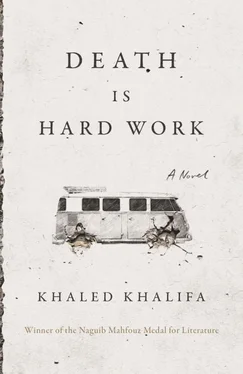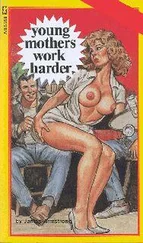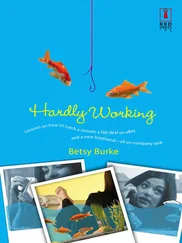Bolbol was deeply moved by Lamia’s sympathetic glances as she held back her tears and accompanied Fatima to the women’s room. All three of the siblings looked appalling, but no one noticed or found it unusual; they had all gone through similar ordeals. When she came back, Lamia squeezed Bolbol’s hand, pleased that he was carrying out his father’s last wish; she described his father as a great man, a martyr, and a revolutionary. She gave Bolbol no time to explain everything they had gone through on the road and went on to say that she was cooking for six families and thirty children, assisting them and making them as comfortable as she could. Zuhayr was kind to the siblings and thanked them for asking if they could help. Really, both husband and wife were like people from another age, Bolbol thought as he watched Zuhayr and Lamia gladly and indefatigably attend to the needs of each of their guests. They were nothing like his neighbors, who had driven out three families, displaced from Yarmouk Camp, on the pretext that they were extremists, probably terrorists, merely because the women wore the hijab. The sight of the expelled made one’s heart bleed; but, then, the sight of the impoverished local women was simply sickening. They encouraged their children to pelt the homeless families with stones, yelling curses at these traitors who’d turned their backs on a regime that had housed them, raised them, and educated them in its schools.
Hussein put an abrupt end to the discussion. He asked Lamia for two blankets and a pillow, and after dinner he slipped out to the bus, spread out on its floor, and fell into a deep sleep. Zuhayr suggested to Bolbol, who was grappling with his usual shyness, that he might like to bathe, but added cheerfully that he would have to heat the water in the cistern using firewood, not gas; the electricity only came on for two or three hours a day. Bolbol thanked him and asked for somewhere to lie down. He was so exhausted he could no longer grasp what the men here were saying, passing the time by discussing the latest news or trying to phone someone who had stayed in the besieged city of Homs. The story of their father’s body got no sympathy from them; they had seen too many bodies already. As ever, death was so close to them that they had stopped giving it any particular consideration.
Zuhayr generously offered to let Bolbol sleep on his and Lamia’s own bed in the corner of the kitchen, but Bolbol chose instead to use a twice-folded blanket for a mattress, then another to cover himself up. He couldn’t get over the fact that Zuhayr and Lamia were sleeping here now after giving everything they had to refugees from Homs—total strangers. Lamia repeated Abdel Latif’s favorite saying in a low voice: “The children of the revolution are everywhere.” Bolbol shut the kitchen door and tried to sleep. He was cold and slow to feel any warmth seep into his body. He tried to push away evil thoughts: Lamia slept here, right there on that bed in the corner of the large kitchen, leaving her bedroom to the children. Here, her breath circulated every night… The mattress, only a few centimeters away, smelled strongly of Lamia. Bolbol was bewildered by his growing state of arousal. There was, of course, one way for him to relax—he didn’t even feel especially ashamed at the prospect of betraying a man and a woman who had shown him every generosity. After all, the horrific tension was almost killing him, he had no way of sleeping, his senses were inflamed. Even crying would be better than doing nothing; he wished he could manage it. Crying would relax him, wash him clean. And no one would ask a man transporting his father’s corpse across the country why he was crying. Bolbol buried his head in his blanket and heard a knocking sound in his head. He began to feel that he would surely die here; in fact, he craved it; Lamia would then bury him with her own beautiful hands—such a terrible tragedy for her! It got to be eleven o’clock at night, and intermingling voices were still coming from the large room where everyone else was gathered as if for a party. He even heard distant laughter. Yes, there was only one way of relaxing. So Bolbol closed his eyes and tried to recall a particular image of Lamia. When they were students, she had brought over some extra course materials for him, and his mother had persuaded her not to head home for Deir Rahibat but to stay the night with them. Bolbol had spied on her at dawn as she was sleeping in Fatima’s room. She was like an angel in that bed, her legs revealed by a short cotton nightshirt. Her breasts were firm, and there was the ghost of a smile on her face… But now the shame came flooding in. Bolbol scrambled to his feet. He left the kitchen, lit a cigarette, and began to feel calmer. He quieted his conscience; he would sleep, he wanted to sleep, he needed to sleep so he could take his father’s body to Anabiya. From there he would cross the border to Turkey and never come back to this country again. What an excellent new idea. He went back to the kitchen and lay down. The voices in the next room receded, and he fell asleep.
Only a couple of hours later, he was shaken awake into a state of instant terror. Hussein was standing by his head, shouting that the nurses were throwing their father’s body out into the street. Lamia was waiting for them in the minibus, worried and angry. They had called her to come and take the body away because, once again, the bodies of soldiers killed in a nearby battle were being brought to the hospital.
Zuhayr had gone ahead; as they arrived, they could hear him fighting with one of the nurses who had now taken up cursing their father. Bolbol went into the morgue to sign for the body so Hussein and Zuhayr could carry it back to the bus. It was a terrifying scene. There were more than forty corpses there in military dress; some had lost their lower extremities, others half their heads. A furious officer was speaking to someone out of sight, requesting more ambulances from the hospital in Homs. Bolbol felt sick. He managed to reach the office amid the chaos, but the nurse there didn’t understand what he wanted. Bolbol asked for the doctor on duty. The nurses were opening the morgue fridge and piling bodies on top of one another like lemon crates; their tiny fridge hadn’t been designed to deal with so many bodies. Bolbol dug through the mound of papers on the office desk and found the release forms. Clutching these, he looked through the large register, signed his own name next to his father’s, and left like he was fleeing hell, almost deranged by fear. If someone thought to ask him for his identity card in all this chaos, he could wind up dead.
On the ground floor of the hospital, a large number of people from the surrounding towns and villages were looking for the bodies of their sons who had died that night. The furious nurse was still cursing Abdel Latif, calling him a terrorist, threatening Zuhayr and Lamia and insulting their whole family. Everyone piled into the minibus, which was thankfully ready to leave. Lamia looked sadly at Abdel Latif’s face. It had begun to swell; its skin was turning blue and a shade of green that looked almost moldy. Back at the house they drank coffee while Lamia rewrapped Abdel Latif’s shroud, removing the smelly blankets that were still soaked from the slabs of ice and replacing them with clean ones. She also placed sweet basil around the corpse’s head, perfumed him all over, and gave Fatima the large bottle of cologne to sprinkle on him from time to time. Then the five of them sat in silence, sipping their coffee, surrounding the dead man, and waiting for dawn.
two
A BOUQUET FLOATING DOWN A RIVER
At dawn, the minibus hurried away from Z.
The air was cold, and the cologne wafting through the car put the siblings in a serene state of mind. The feeling that they had the whole day ahead of them made them feel confident of arriving at Anabiya before nightfall. The road was narrow, and the big passenger buses passing alongside them made them less desolate and afraid; they weren’t alone out here. The bus passengers looked pitiful, and they seemed to have been traveling a long time. Their clothes were tattered and poor, and desperation had settled on their faces as they stared at the road ahead. Most of the buses were old, their glass windows shattered, and on the backs of each were bundled the possessions of these people fleeing the country for somewhere safer. It was a mass exodus, hundreds of thousands of people heading from the north and the east toward the unknown.
Читать дальше












